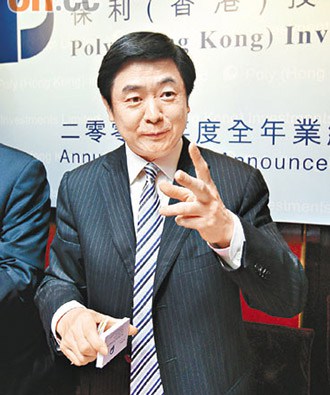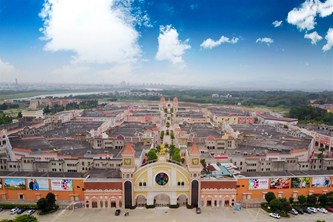
Poly Property boss Xue Ming may soon be changing into his white knight costume
A unit of mainland conglomerate Poly Group has agreed to provide a HK$70 million ($8.92 million) transitional loan to insolvent Hong Kong construction and real estate firm Hsin Chong Group, as well as to invest at least another HK$1.56 billion in the company, once it has successfully restructured its debt.
In a filing to the Hong Kong stock exchange last week, Hsin Chong said it has entered into a framework agreement with Poly Opulence Limited, a unit of locally incorporated Poly Property, citing its “significant financial burdens and difficulties in repaying its liabilities.”
The move, which comes after some of Hsin Chong’s creditors had filed winding-up petitions against the nearly eight-decade-old company, and will allow the state-backed Poly Group to continue to expand its foothold in Asia’s most valuable real estate market.
Throwing Hsin Chong a Lifeline
Under the terms of the agreement, as announced by Hsin Chong, Poly Property has agreed to provide funds to facilitate the restructuring of Hsin Chong and to subscribe for new shares and/or convertible bonds at a price and on terms to be agreed when the company has completed the debt restructuring process and once its shares resume trading on the main board of the stock exchange.
The agreement could mean a much-needed lifeline for Hsin Chong Group, which has been suspended from trading its stock on the Hong Kong exchange since April 2017 due to its financial woes.
According to the statement, Poly is to provide Hsin Chong with a HK$70 million transitional loan at a 12 percent annual interest rate, to be compounded daily. The loan will only be used to pay fees and expenses relating to the debt structuring, and to the resumption of trading on the stock exchange.
Poly has also agreed to invest no less than HK$1.56 billion ($199 million) to subscribe for newly issued shares and/or convertible bonds issued by Hsin Chong, mainly for financing the company’s working capital for business operations, but not for repayment of existing debts.
Acquiring Hsin Chong appears to be in line with Poly Property’s determination to grow its Hong Kong business. In August of last year the developer elbowed its way past nine competing bidders to win a tender for a 3,689 square metre (39,708 square foot) residential site in Hong Kong’s Yau Tong area for HK$3.3 billion. That residential acquisition came after Poly had spent HK$3.92 billion in 2014 to acquire a site in Kai Tak which it later developed into the luxury project Vibe Centro. Then in 2015, the company set a high-water mark for the New Territories that year with its HK$3.5 billion purchase of a site in Tuen Mun.
Old Line Construction Firm Changes Hands
The 79-year-old construction company, founded in Hong Kong by the Yeh family during the early years of the Second World War, has been involved in building some of Hong Kong’s iconic landmarks, including Ocean Park and the former Kai Tak Airport.

Hsin Chong’s HK$10.6 billion mixed-use real estate project in Foshan
In recent years, it turned to building hotels in Macau, including the Sands, the Venetian Macau Resort Hotel, Four Seasons Macau Resort, Sands Cotai Central and the latest Parisian Macau.
The Yeh family ceded control of Hsin Chong to Shenzhen’s Mission Hills Group in 2007 and later to Shanghai tycoon Lin Zhouyan. Since then the company has taken on more projects in mainland China, including a HK$10.6 billion ($1.35 billion) real estate project in the Foshan’s Sanshui district in Guangdong province.
Hsin Chong’s financial problems can be largely attributed to its rapid expansion into mainland China’s projects. The company’s net gearing was reached 102 percent, 114 percent and 134 percent for 2016, 2017 and the first half of 2018 respectively. Hsin Chong’s net losses reached HK$2.73 billion and HK$774 million in 2016 and 2017. Trading of Hsin Chong’s shares has been suspended since April 3, 2017.
The South China Morning Post reported in September last year that Shanghai government-owned Greenland Holdings was in discussions to take over 100 percent of Hsin Chong Construction Group, as well as the majority stake of its listed parent Hsin Chong Group Holdings. However, there has not been any noted progress since regarding the deal.
Hsin Chong announced last May that it would default on $300 million in securities that year. This January the company again failed to repay $150 million in notes.
Leave a Reply